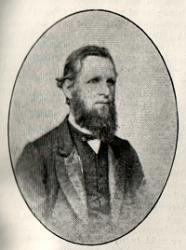
1828 - 1919 Person Name: Lewis T. Hartsough Author of "None Other Now But Jesus" in The Cyber Hymnal Hartsough, Lewis, was born at Ithaca, New York, Aug. 31, 1823. Of his hymns the following are in common use:—-
1. I hear Thy welcome voice. The Divine Invitation.
2. In the rifted Rock I'm resting. Safety in Jesus.
3. Lead me to the Rock that's higher. Safety in Jesus.
4. O who'll stand up for Jesus? All for Jesus
Nos. 1-3 are in I. D. Sankey's Sacred Songs & Solos, 1878 (1 and 3 with music by Hartsough).
--John Julian, Dictionary of Hymnology, Appendix, Part II (1907)
=================
Hartsough, Lewis, p. 1569, ii. Mr. Hartsough entered the ministry of the Methodist Episcopal Church in 1851, and is now (1905) residing in Mount Vernon, Indiana. He was musical editor of J. Hillman's Revivalist, Troy, 1868, and co-editor of The Sacred Harmonist, Boston, 1864, and Beulah Songs, Phila., 1879. In addition to the hymns named on p. 1569, ii., "Let me go where saints are going" [Heav'n desired] (1861) has come into common use. It appeared in W. B. Bradbury's Clarion, 1867, p. 83. Concerning his hymn, "I hear Thy welcome voice," Mr. Sankey says in his My Life and Sacred Songs, 1906, p. 11(3:—
The words and music of this beautiful hymn were first published in a monthly, entitled, Guide to Holiness, a copy of which was sent to me in England. I immediately adopted it, and had it published in Sacred Songs and Solos. It proved to be one of the most helpful of the revival hymns, and was often used as an invitation hymn in England and America." [Rev. L. F. Benson, D.D.]
--John Julian, Dictionary of Hymnology, New Supplement (1907)
================
Hartsough, Lewis. (August 31, 1823--January 1, 1919). Details of his early life are lacking. After being admitted to the Oneida, New York, Conference of the Methodist Episcopal Church in 1851 and serving several pastorates in that state, his health failed and he went to Utah where he was influential in establishing the Utah Mission, later becoming its superintendent. Upon relinquishing that position he moved to Mt. Vernon, Iowa, where he spent the remainder of his life. Bird's statement that he lived in Indiana is erroneous. He was minister of the South Street Methodist Episcopal Church, Utica, New York, when he first became associated with Joseph Hillman, who chose him to act as musical editor of The Revivalist, a gospel hymn book which went through eleven editions in five years, 1868-1872. This book had a remarkable sale and was doubtless used in more churches during the 1870s than any other of similar character. To it the Reverend Hartsough contributed, in one edition, twelve texts, fourteen tunes, and thirty arrangements of tunes, several of the latter being of the religio-folk variety which had been so popular in the early camp meetings. It is a valuable source work.
"I love to think of the heavenly land" (p.1573) is by Hartsough. "I hear thy welcome voice (p.1569), originally in six four-line stanzas, with Refrain, in full S/1931; with the first three stanzas, slightly emended, Brethren/1951; with stanzas 1, 2, 3, and 5, also emended, in Hymns of the Living Faith, 1951. Writeen in 1872 with musical settings by the author, it is the only one of his many songs which has continued in use.
Source: Metcalf, Frank J. American Writers and Compilers of Sacred Music; several editions of The Revivalist.
--Robert G. McCutchan, DNAH Archives
Lewis Hartsough


 My Starred Hymns
My Starred Hymns




